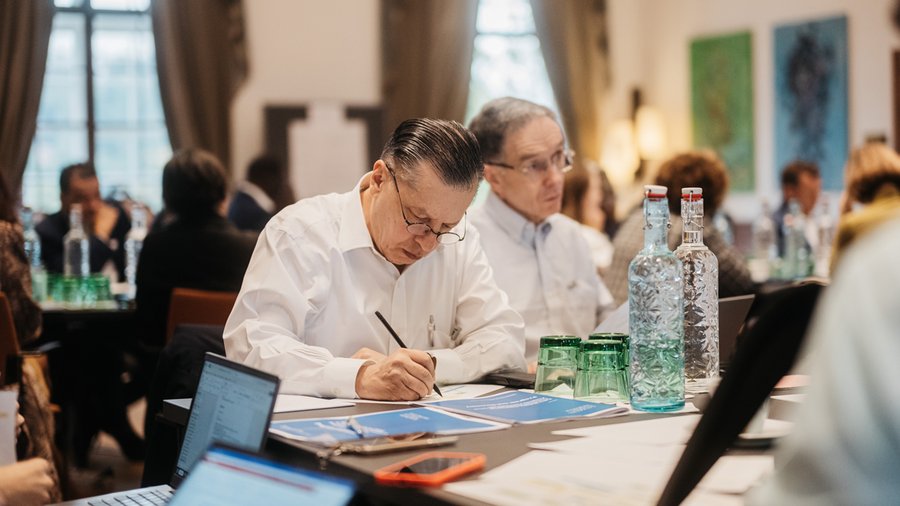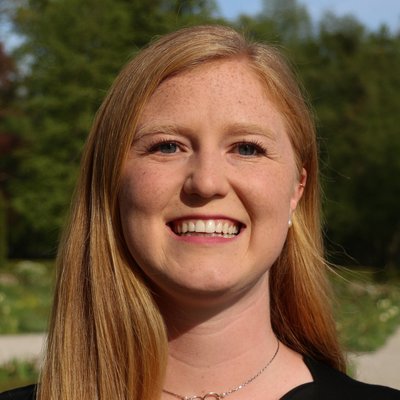Addressing environmental and social challenges in the global move towards renewable energy
Gonzalo Canseco Gomez is the director of research and development at onepoint5, a consultancy specializing in sustainability and ESG issues, with an emphasis on climate change. Prior to his current position, he served as Special Advisor to the UNFCCC Framework Convention on Climate Change, where he contributed to global climate policy. He is also a founding partner of Simbiosis Económica, a Mexico City-based consultancy on economic, financial, and public policy strategies with a focus on sustainability. Over his 20-year career, he has held senior roles across multiple Ministries of the Mexican Government. These include the Ministry of Foreign Affairs, where he served as Chief of Staff, Head of Policy Planning, and in diplomatic postings in London and Paris.
Audrey Plimpton, Salzburg Global Communications Associate: In one sentence, what does a just transition from oil, gas, and fossil fuels mean to you?
Gonzalo Canseco Gomez, Founding Partner, Simbiosis Económic: I think it is an opportunity to address current and future challenges on sustainability and to redress wrongs from the past, both in environmental and social aspects.
AP: What are the benefits of implementing just energy transitions worldwide?
GCG: First and foremost, it is [about] lowering carbon dioxide emissions, which is vital for everybody everywhere. It is also an opportunity to provide new ways of addressing our needs through a new economic model that is not based on fossil fuel consumption but on new technologies... We are on the cusp of a new transition, and it is an opportunity to not only address environmental challenges but also provide new opportunities for people across the world.
AP: What do you think are the most important factors that should be considered when planning and implementing just energy transitions?
GCG: The first one is to be led by science. This transition is unique because it is not just the response of technological improvements or the interaction of market forces. This is driven by our awareness that the previous model was toxic, that it was harming the environment, and leading to a crisis that has been rightly called an existential threat. This is, therefore, different from previous transitions. Science is a key aspect, and, of course, fairness — an equitable share both in the burdens and the benefits that derive from this transition.
I come from Mexico, which was for 300 years a colony of a European power. It has been an independent nation for more than 200 years. We have both the experience of being at the periphery of the international system and also, for 200 years now, being an active participant as a sovereign nation. I think we fully understand that this change should involve a sense of fairness and justice, both for those countries that are industrialized and more developed and those that are still developing and need more support, especially the most vulnerable countries.
AP: How can evidence-based research be better integrated into policymaking to ensure that just transitions are effectively implemented?
GCG: There's a lot of research being done across the world. The best way to integrate it more fully into policy planning is to increase the dialogue between policy planners and people carrying out research. Much of it is done in academic institutions. There are also many think tanks and consultancies trying to figure out a way to accelerate the transition to a sustainable economy and a regenerative circular economy.
I think [we need] more fora and closer dialogue between policymakers and those responsible for corporate strategy because this is not just an issue for governments; companies of all sizes need to understand the challenges. For that, in many cases, they should go to specialists who can help them get a clearer grasp of what the international climate regime means for them and how they can be better aligned with the overarching goals of the Paris Agreement.
AP: How can we better align international conversations and commitments with domestic policy planning and implementation?
GCG: It is ultimately up to national governments. We live in a world made up of sovereign states. The Paris Agreement [and] the UN Framework Convention on Climate Change are indications that governments are conscious of the threat posed by climate change and the need for action. We have, in my view, a very robust framework for climate action. But it is ultimately up to countries to implement it. The way to improve that alignment is to have sovereign countries and the governments of those countries live up to the commitments they have made and avail themselves of the many resources at their disposal to achieve that.
AP: How can the "Policy Dialogue on Just Energy Transitions: Identifying Pathways to Prosperity Post Fossil Fuels" inform your work on this topic?
GCG: It is extremely helpful to participate in seminars and fora like this because you get to hear very different perspectives. You gain in a matter of a few days an immense amount of information and insight into the challenges of different actors.
In this case, we have been trying to understand what a just energy transition looks like for different countries. We have cases of nations that are highly dependent on fossil fuel exports and others that are dependent on fossil fuel imports for their energy needs. By convening a group like this, we are able to come up with new ideas and think outside the box. I think each of us leaves with an enriched vision of the problems and, hopefully, with new ideas to solve them.
Gonzalo Canseco Gomez attended the "Policy Dialogue on Just Energy Transitions: Identifying Pathways to Prosperity Post Fossil Fuels" in September 2024.



